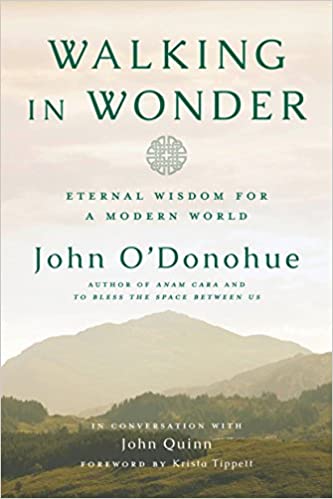Books |
John O’Donohue: Walking in Wonder: Eternal Wisdom for a Modern World
By
Published: Jan 09, 2022
Category:
Spirituality
John O’Donohue was a student of Hegel who wrote his Ph.D. dissertation in German, an Irish priest, and then not a priest, but at all times a thinker, a very human thinker. A number of Butler readers have bookmarked and shared this video — watch the first three minutes and you’ll see his appeal.
But let’s say you’ve never heard of John O’Donohue or his great first book, Anam Cara? Have you been to a funeral in the last two decades? Many speakers who used to quote Rumi and Rilke moved on to O’Donohue.
In the fall of 2007, a few months before O’Donuhue went to sleep in the south of France and didn’t wake up, he had a three-hour conversation with Krista Tippett, creator of the NPR program “On Being. There’s a transcript and an unedited tape — something you never hear.
Tippett wrote the introduction for “Walking in Wonder: Eternal Wisdom for a Modern World.” She writes: “It was as though this man had five answers for every question. He had geologic layers of personality.” (Talk about “containing multitudes!”)
The book is a set of radio interviews with his friend John Quinn. It isn’t a “written” book. Not to worry: O’Donohue in conversation is exactly as pithy and eloquent as he was as a writer. Samples”
I always think the secret of change is that there are huge gestations and fermentations going on in us that we are not even aware of. And then, sometimes, when we come to a threshold, crossing over, which we need to become different, we’ll be able to be different, because secret work has been done in us, of which we’ve had no inkling.
In the West of Ireland where I live, a sense of time, that there’s time for things, and that when God made time, he made plenty of it, and all the rest of it. One of the huge difficulties in modern life is the way time has become the enemy.
One of the most beautiful and frightening days in the life of a human is when their mind really wakes up.
Memory is the place where our vanished days secretly gather, providing a beautiful shelter and continuity of identity. In a strange way everything that happens to us remains still alive within us. Sometimes it takes either focused attention to the past or merely a trigger moment to set off a sequence of memories.
Impossible to read this without thinking of front-line workers — doctors and nurses, teachers, and home care helpers, 2000- present:
As we are speaking, there are individuals holding out on frontlines, holding the humane tissue alive in areas of ultimate barbarity, where things are visible that the human eye should never see. And they’re able to sustain it, because there is, in them, some kind of sense of beauty that knows the horizon that we are really called to in some way. I love Pascal’s phrase, that you should always keep something beautiful in your mind. And I have often — like in times when it’s been really difficult for me, if you can keep some kind of little contour that you can glimpse sideways at, now and again, you can endure great bleakness.
And isn’t this a commentary on a certain strain of our national politics:
One of the sad things today is that so many people are frightened by the wonder of their own presence. They are dying to tie themselves into a system, a role, or to an image, or to a predetermined identity that other people have actually settled on for them. This identity may be totally at variance with the wild energies that are rising inside in their souls. Many of us get very afraid and we eventually compromise. We settle for something that is safe, rather than engaging the danger and the wildness that is in our own hearts.
A question he liked to ask: “What was your last great conversation with someone?”
Suggestion: this conversation.
[To buy the paperback from Amazon click here. For the Kindle, click here.]


